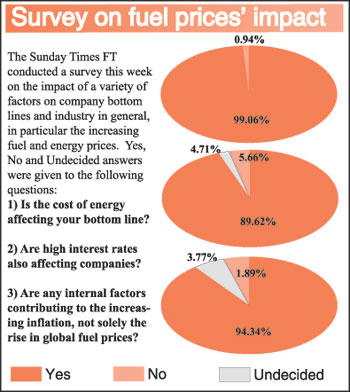
Fuel hike hurts companiesSurvey - Nearly 100 percent agree:
Fuel prices, which is causing a chain reaction in costs across-the-board, have hit the roof and indications are that overseas oil is rising and unlikely to fall below the 100 dollars a barrel level. Well-known economist Dr Sirimal Abeyratne from the University of Colombo says, “Billions of rupees are vanishing from the economy every year without any productive use because the right decisions were not taken at the right time, causing price distortions and inefficiencies. But people still have to pay for these losses out of their pockets”. He said citizens bear a "double blow" because they are not only paying for rising prices in the future but also for subsidized consumption in the past, adding that the Ceylon Petroleum Corporation (CPC)'s losses are reportedly Rs. 7.3 billion upto April 2008 while the Ceylon Electricity Board, which also runs with massive operating losses of over Rs. 20 billion, already owes Rs. 28 billion to the CPC alone. In a rare, near 100 percent agreement for any of several email polls conducted by the financial section of this newspaper on a variety of issues of general, economic and business interest, 99 percent of the respondents agreed that fuel costs are affecting the bottom line of companies. Only one respondent disagreed that current fuel prices are hurting companies. Some 89 percent agreed that high interest rates are also affecting companies or institutions while 94 percent agreed that government spending was also fuelling inflation. (See chart for full results) .The survey drew 266 responses from a total of 400 who were polled and covered CEOs, head of companies, economists, academics with an eye on the markets and business, private sector workers across-the-range, and other connected parties. Many respondents, including business leaders who preferred to remain anonymous, used the opportunity to speak out their frustrations and express their anger over government spending including extravagant parties where ministers and high government officials wine and dine regularly. “Another good example of the mismanagement of the economy is the Mihin Air disaster. It’s a colossal unnecessary waste of tax payers’ money. This is a blatant example of confusing patriotism and ‘naive cronyism’. Even when stronger airlines in the US are ‘throwing in the towel’, the cronies in Sri Lanka persist on trying to resurrect this dead duck at public expense. Why can’t the OPA or some other organisation take legal action against this gross wastage of tax payers’ money in this poor country?” asked a senior executive in a Colombo firm. |
|
|
||||||
|
||||||
| || Front
Page | News
| Editorial
| Columns
| Sports
| Plus
| Financial
Times | International
| Mirror
| TV
Times | Funday Times || |
| |
Reproduction of articles permitted when used without any alterations to contents and a link to the source page.
|
© Copyright
2008 | Wijeya
Newspapers Ltd.Colombo. Sri Lanka. All Rights Reserved. |
 Fuel and energy costs are ‘hurting’ the corporate bottom line, cutting profits and showing in the results of a range of Sri Lankan companies, a survey by The Sunday Times FT shows.
The email poll also revealed the anger of most people over rising government expenditure while the state urges the public to cut consumption and tighten one’s belt.
Fuel and energy costs are ‘hurting’ the corporate bottom line, cutting profits and showing in the results of a range of Sri Lankan companies, a survey by The Sunday Times FT shows.
The email poll also revealed the anger of most people over rising government expenditure while the state urges the public to cut consumption and tighten one’s belt.